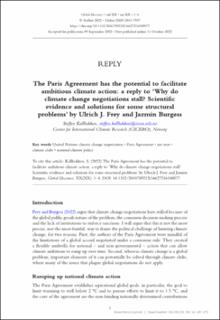The Paris Agreement has the potential to facilitate ambitious climate action: a reply to ‘Why do climate change negotiations stall? Scientific evidence and solutions for some structural problems’ by Ulrich J. Frey and Jazmin Burgess
Peer reviewed, Journal article
Accepted version

Åpne
Permanent lenke
https://hdl.handle.net/11250/3119034Utgivelsesdato
2022Metadata
Vis full innførselSamlinger
- Journal articles [478]
Originalversjon
10.1332/204378921X16627216100877Sammendrag
Frey and Burgess (2022) argue that climate change negotiations have stalled because of the global public goods nature of the problem, the consensus decision-making process and the lack of institutions to enforce sanctions. I will argue that this is not the most precise, nor the most fruitful, way to frame the political challenge of limiting climate change, for two reasons. First, the authors of the Paris Agreement were mindful of the limitations of a global accord negotiated under a consensus rule. They created a flexible umbrella for national – and non-governmental – action that can allow climate ambitions to ramp up over time. Second, whereas climate change is a global problem, important elements of it can potentially be solved through climate clubs, where many of the issues that plague global negotiations do not apply.
Utgiver
Bristol University PressTidsskrift
Global DiscourseBeslektede innførsler
Viser innførsler beslektet ved tittel, forfatter og emneord.
-
Broadening the climate regime: Design and feasibility of multi-stage climate agreements
Torvanger, Asbjørn; Bang, Guri; Kolshus, Hans H.; Vevatne, Jonas (CICERO Report;2005:02, Research report, 2005)To meet a climate target like maximum 2 ºC temperature increase by 2100, participation in efforts to reduce emissions of greenhouse gases must be broader than that in the Kyoto Protocol. It will also require emission ... -
Climate Clubs: a Gateway to Effective Climate Cooperation?
Hovi, Jon; Sprinz, Detlef F.; Sælen, Håkon; Underdal, Arild (Peer reviewed; Journal article, 2017)Although the Paris Agreement arguably made some progress, interest in supplementary approaches to climate change co-operation persist. This article examines the conditions under which a climate club might emerge and grow. ... -
The state of climate research and climate policy
Torvanger, Asbjørn; Alfsen, Knut H.; Kolshus, Hans H.; Sygna, Linda (CICERO Report;2001:02, Research report, 2001)The aim of the report is to give an overview of the state of climate research and international climate policy negotiations until May 2001. The report presents a collection of factual information based on reports from the ...